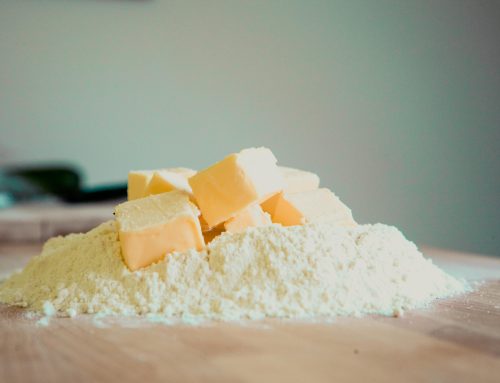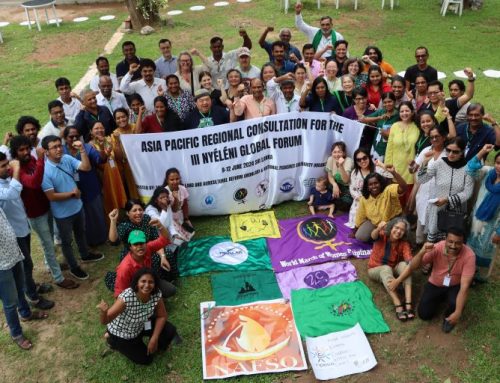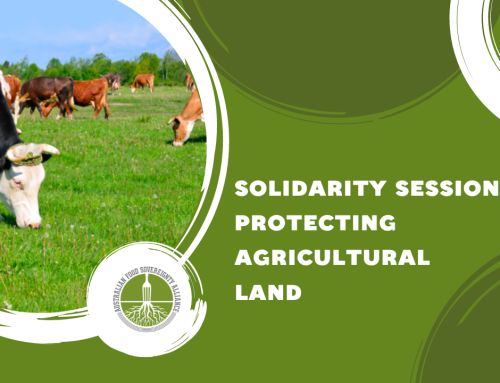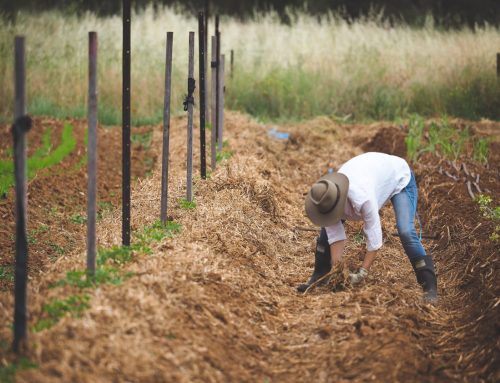Story by Russ Grayson, December 2014
A Northern NSW “permaculture farmer” calling for a boycott of halal foods and linked with an alleged far-right anti-Islamic group could bring the permaculture design system into disrepute if her beliefs are taken to be representative of permaculture.
Her move to force the costs of certifying food as halal, suitable for Moslems to eat, onto Moslems and the partially successful moves to force food companies to drop halal certification should alarm food sovereignty advocates as it reduces people’s control over the food they eat by limiting their freedom of choice.
Her name is Kirralie Smith and her story was carried by the Sydney Morning Herald online on 28 December this year.
The Herald lead describes Kirralie as ” …a permaculture farmer from northern New South Wales and a mother of three. She is also the public face of the virulent campaign to boycott halal food and products.”
[pull_quote align=”right”]We aim to Not buy halal products & services, because they fund Islamic expansion by any means[/pull_quote]It continues: ” …Smith’s Facebook page Boycott Halal in Australia has 41,000 supporters. She speaks at events organised by ‘Islam-critical’ groups such as the Q Society, which has also been involved in local campaigns to stop mosques being built. Her Halal Choices website, she says, gets 80,000 visitors a month.”
Boycott Halal in Australia says in its ‘about’ column’s general information that: “We aim to Not buy halal products & services, because they fund Islamic expansion by any means” (punctuation reported as is).
A 27 December posting on the group’s Facebook seeks to disassociate itself from Kirralie: Another article – Why halal certification is in turmoil… with lots of information from our Page – but again the False Assumption that Kirralie Smith is involved here at Boycott Halal – which she is not & she is as flabbergasted as we are by this Media confusion.
“Note that Kirralie Smith is behind the very informative HALAL CHOICES website and is featured in the excellent Q Society Video about Halal Certification which we often feature… but she is not involved here at Boycott Halal.”
[pull_quote align=”right”]Businesses themselves have to accept the blame for any loss and can only bring themselves discredit by choosing to be bullied by the anti-Islam lobbyists[/pull_quote]The Herald article describes how the anti-halal movement applies pressure on Australian food companies to drop halal certification, a move successful in one instance but resisted by other food companies. A 21 November article in New Matilda this year reported that the Byron Bay Cookie Company was hounded about its halal certified Anzac cookies and that South Australia’s Fleurieu Milk and Yogurt Company was forced to back out of a contract to supply Emirates airline.
There are implications in this strategy for Australian food exporters. Businesses themselves have to accept the blame for any loss and can only bring themselves discredit by choosing to be bullied by the anti-Islam lobbyists rather than stand up to them in a public way that focuses attention on the Islamophobe’s tactics and agenda.
Halal foods are certified as appropriate for Moslems just as kosher foods are certified for consumption by Jews. The article goes on to discuss the halal certification process and controversies within it.
Kirralie, who has a BA in theology, says halal certification imposes costs on food for all Australians and constitutes a religious tax. She wants the Corporations Act 2001 changed so that only Moslems bear the cost of halal certification. In an October 2012 article entitled Is Halal Funding Terrorism? on australianchristians.com.au, Kirralie says that money paid for halal certification is used, partially or in whole, for the push for sharia law (the Islamic legal code) in Australia. Yet, she doesn’t link the cost of certifying kosher foods to overall food prices, nor that of certifying organic foods (although that would not constitute the alleged religious tax).
[pull_quote align=”right”]…certification is a “scam” to raise money for building mosques and, by implication, for funding jihad…[/pull_quote]Kirralie alleges that halal certification is a “scam” to raise money for building mosques and, by implication, for funding jihad. The Q Society video linked to her website says that halal certification was not traditionally required of Moslems in past times and is now a means to make money.
The Herald reported that the Australian Crime Commission had found no links between the legitimate halal certification industry and the financing of terrorist organisations.
The Q Society, with which Kirralie is linked, describes itself on its website as anti-Islamic — the words are the heading of one of the website’s drop-down menus. Click it, and you find this: “For too long Islam has enjoyed immunity from necessary analysis, due criticism and debate because of its status as ‘just a religion’. Unfortunately, if we continue to tolerate Islam without understanding it, Australia as a free, secular democracy will be lost…”.
The Society also warns against “…the systematic Islamisation of our schools in textbooks, curriculum, tuck shops, uniforms and installation of parallel rules”. It describes itself as a not-for-profit “civil rights organisation… to inform Australians about Islam”.
A not-always-friendly media
The Q Society and Kirralie have received extensive media coverage and for groups like them coverage is good news because it gets their messages to people who otherwise they might not be able to reach. Even when the coverage is critical, which is what much of it has been, it exposes their ideas to people predestined to think like they do and who are confused about Islamic immigration and the links between a small number of Islamic organisations and combatant, insurgent organisations like Dash/ISIS/Islamic State.
The Age newspaper on 23 June 2014, in an article entitled Far-right group spreading anti-mosque message in Bendigo, disclosed that the Society was behind the campaign against the building of a mosque in the Victorian city.
In an 26 June 2014 article on news.com entitled Revealed: The secretive Q Society’s battle against Islam, the Q society was described this way: “THEY are a group of ‘concerned citizens’, but are very hesitant to say who they really are. If you want to go to one of their meetings, you have to sign a nondisclosure agreement.
“Their only address is a PO Box in suburban Melbourne. They won’t say exactly where their money comes from and say they never will. And they are very opposed to Islam in Australia. The secretive organisation known as the Q Society has this week been linked to a noisy campaign to stop the construction of a mosque in Bendigo, Victoria.”
Media coverage presents a dilemma because it exposes organisations and individuals to people ready to hear and act on their messages while meeting the media responsiblity to report on the activity of such groups. The dilemma came to public notice with the controversy over the BBC giving equal time to climate change deniers as to majority scientific opinion. The result was that the deniers were perceived to represent significant public opinion and that their argument was as valid as that of scientists warning against further climate change although the science demonstrated otherwise.
This distorts the context and proportionality of contending ideas and organisations around issues. It stems from established journalistic practices around fairness, however it ignores the reality that small groups do not represent significant public opinion. It works in favour of organisations like the Q Society.
A challenge to permaculture’s reputation
Permaculture is a practice with a broad range of participants. There are Greens supporters, Labor supporters and — who knows? — even Liberal supporters. There are people from the different flavours of Left and the Right and those who seek a better way than adherence to tired, Twentieth Century ideologies. There are Christians, Buddhists, agnostics, atheists, Jews and — yes, Moslems too (perhaps the most prominent being the Permaculture Research Institute’s educators and consultants, Geoff and Nadia Lawton).
So it should come as no surprise that a whole range of beliefs and attitudes are present within the permaculture design milieu. What has been absent however, are those actively engaged with fringe political groups who publicly identify as permaculture practitioners. It is this that creates the difficulty with Kirralie’s association with anti-Islam organisations.
[pull_quote align=”right”]By late December other media had picked up on the Herald story and in most of the online links the word ‘permaculture’ appears in association with Kirralie’s name[/pull_quote]As an Australian living in a democracy, Kirralie has freedom of association, including with small political groups of dubious intention. She also has her freedom to express what she thinks, including about the halal industry and Islam. Sure, that will offend some but in a democracy where you can say what you like without resorting to hate speech, you’re bound to offend someone, somewhere. Offence is part of democracy.
Kirralie’s being linked with permaculture risks the design system being associated with her personal beliefs and anti-Islamic activities. By late December other media had picked up on the Herald story and in most of the online links the word ‘permaculture’ appears with Kirralie’s name. It may be assumed that her beliefs reflect those within the permaculture milieu and it is this that has potential to discredit the design system. Kirralie’s Pinterest presence has a page on permaculture gardening.
Another issue is that pressuring food manufacturers to drop halal certification would reduce freedom of choice for those seeking those foods. That would be of concern to Australia’s food sovereignty advocates such as the Australian Food Sovereignty Alliance that advocate people’s control over their food systems. So too should Islamophobic bullying of Australian food businesses.
The incident also raises the question as to how seriously permaculture practitioners, and Kirralie, take the Second Ethic of permaculture that talks about care of people. Can you really care for the wellbeing of people if you seek to remove the certification of the food they choose to eat?
Read more…
- Find the Herald’s story ‘Why halal certification is in turmoil‘
- Find Kirralie’s ‘Halal Choices‘ website
- Find the Facebook page, ‘Boycott Halal in Australia‘
- Website of the Q Society
- news.com article ‘Revealed: The secretive Q Society’s battle against Islam‘
- The Age article ‘Far-right group spreading anti-mosque message in Bendigo‘
- New Matilda article ‘Welcome to the Strange Logic of Kirralie Smith, Anti-Halal Truther‘




